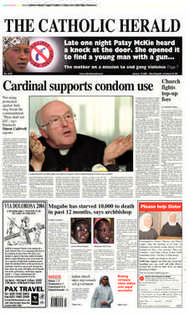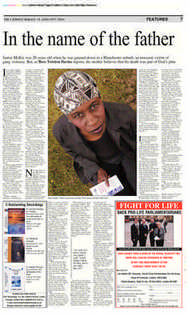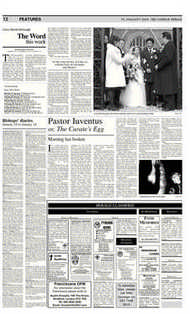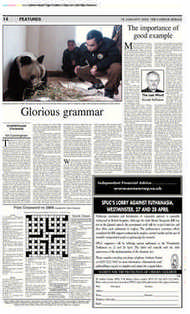Page 1, 16th January 2004
Page 1

Report an error
Noticed an error on this page?If you've noticed an error in this article please click here to report it.
Tags
Share
Related articles
There Is No Plan To Legitimise Condom Use, Says Cardinal
Vatican To Rule On Aids And Condoms
Condoms ‘not Justified In Fight Against Aids’
Archbishop Says Condom Claim Is 'wholly Untrue'
Aids Sufferers Should Always Wear Condoms, Says Cardinal
Condoms And The Fight Against Aids Shock And Awe From
Cardinal supports condom use
ABELGIAN cardinal has publicly stated that he believes condom use could be morally justified in the battle against HIV and Aids.
Cardinal Godfried Danneels, the Archbishop of Brussels and a man once strongly tipped as a successor to Pope John Paul II, broke his silence on the Dutch television channel RKK last Sunday evening.
He said: “When someone is HIV positive and his partner says: ‘I want to have sexual relations with you’ — he doesn’t have to do that, if you ask me — but if he does, he has to use a condom.” The cardinal added: “This comes down to protecting yourself in a preventative manner against a disease or death, [it] cannot be entirely morally judged in the same manner as a pure way of birth limitation.” Cardinal Danneels, 70, explained that an Aids carrier who had sexual intercourse without wearing a condom could be sinning against the commandment not to kill.
The comments by the Flemishspeaking cardinal represent his second foray in recent months into the controversial territory of the use of condoms to prevent Aids.
Last year, he criticised Cardinal Alfonso López Trujillo, the presi
dent of the Pontifical Council for the Family, for suggesting that condoms were so unreliable in preventing the transmission of sexually-transmitted diseases that they should carry health warnings.
His bold remarks are the latest in a series of clashes between the Vatican and the liberal Belgian leader since his election to the college of cardinals in 1983. In 2000, Cardinal Danneels suggested that popes
should not remain in office until death but should have fixed terms. His views, recorded in a book entitled Frankly: Six Discussions with the Cardinal, was interpreted by many Catholics as an attack on John Paul II, 83, who insists on remaining in office in spite of increasing infirmity.
For its part, the Vatican has shown little hesitation in demonstrating its displeasure with the Belgian Church, which has seen a 50 per cent drop in priestly vocations in the last five years. The Pope’s address to the Belgian bishops during their ad limina visit last November was among his most pointed of the year.
“One cannot hide a real and serious concern over the steady and important drop in religious practice in your country, affecting Sunday celebrations and also a number of sacraments, including baptism, penance and matrimony,” the Pope said. The differences between Cardinal Danneels and the Vatican are more than political differences between the liberal and conservative flanks of the Church. The tension over contraceptive use has long threatened to tear the Church in two.
Last October’s BBC Panorama documentary, “Sex and the Holy City”, accused the Vatican of causing poverty and death by prohibiting condom use — a claim that continues
to divide scientific opinion, but which was nevertheless received sympathetically by a number of Catholics.
Organisations such as the US National Institute of Health have argued persuasively that condom use reduces the transmission of the Aids virus by about 85 per cent — as opposed to zero protection — but other studies have argued that widespread condom provision could actually spread disease.
One study in The Lancet concluded that “increased condom use will increase the number of transmissions that result from condom failure” and that a “vigorous condom promotion policy could increase, rather than decrease, unprotected sexual exposure”.
The Linacre Centre for Health Care Ethics, the bioethics institute of the Catholic Church in England and Wales, supports the Vatican’s position on the grounds that the “latest research is sceptical on the benefits of condoms, and hails chastity programmes as the best weapon in the fight against Aids”.
The Church has been deeply divided on the the morality of contraception since Pope Paul VI forbade its use in the 1968 encyclical Humanae Vitae. Some Catholic institutions have refused to accept Church teaching on the subject. In 2002, the London-based Catholic Institute for International Relations declared that condoms were an “important” element in any Aids strategy.
“We, like many others, do not consider this position to be counter to Church teaching,” a spokesman said at the time. “There is a plurality of views from Church leaders and thinkers about the role of condoms. Church teaching includes the acceptance of a secondary effect. Church teaching includes the concept of a lesser of two evils.” This view, however, is also controversial. Some theologians argue that for the “double effect” analysis to be valid, the primary act must be morally good or indifferent. In other words, the end does not justify the means.
blog comments powered by Disqus















